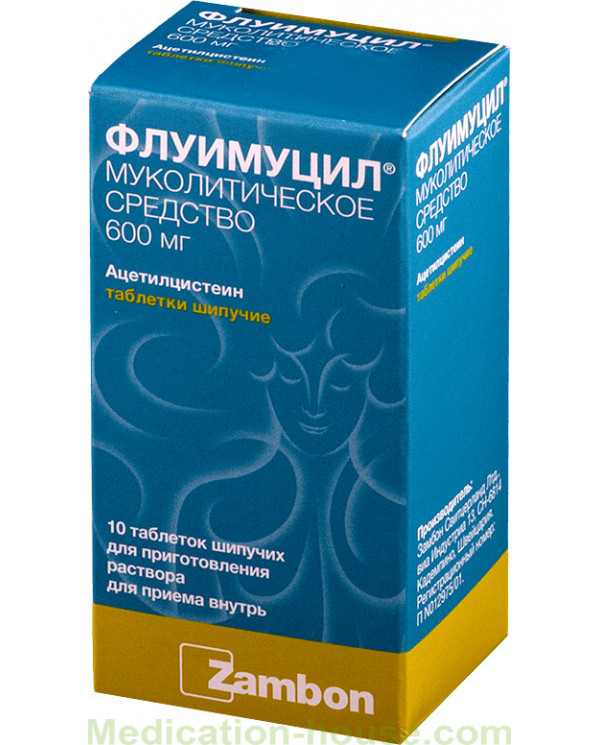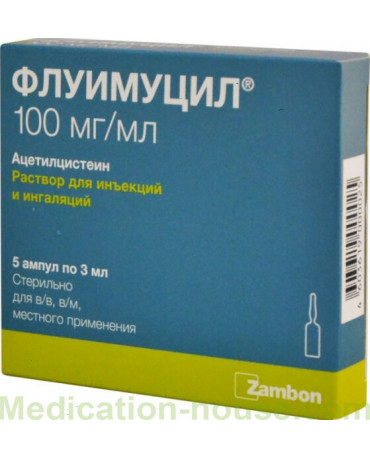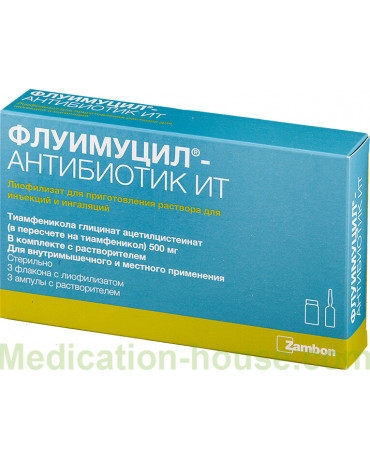Fluimucil instruction
You can buy Fluimucil here
Composition
1 tablet for the preparation of an effervescent drink with lemon flavor contains:
Active ingredient: acetylcysteine 600 mg;
Excipients: citric acid; sodium bicarbonate; aspartame; lemon flavor
pharmachologic effect
Fluimucil dilutes sputum. The presence of sulfhydryl groups in the structure of acetylcysteine helps to break the disulfide bonds of acid mucopolysaccharides of sputum, which leads to the depolymerization of mucoproteins and to a decrease in the viscosity of mucus. Fluimucil remains active in the presence of purulent sputum.
Acetylcysteine has an antioxidant effect due to the presence of a nucleophilic thiol SH group, which easily gives off hydrogen, neutralizing oxidative radicals.
Pharmacodynamics
With the prophylactic use of acetylcysteine, a decrease in the frequency and severity of exacerbations in patients with chronic bronchitis and cystic fibrosis is noted. The protective mechanism of acetylcysteine is based on the ability of its reactive sulfhydryl groups to bind chemical radicals.
Acetylcysteine easily penetrates into the cell, deacetylated to L-cysteine, from which intracellular glutathione is synthesized. Glutathione is a highly reactive tripeptide, a powerful antioxidant, a cytoprotector that traps endogenous and exogenous free radicals and toxins.
Acetylcysteine prevents depletion and enhances the synthesis of intracellular glutathione, which is involved in the redox processes of cells, i.e. contributing to the detoxification of harmful substances. This explains the effect of acetylcysteine as an antidote for paracetamol poisoning.
Pharmacokinetics
Fluimucil is well absorbed when taken orally. It immediately deacetylates to cysteine in the liver. In the blood, there is a dynamic balance of free and plasma protein-bound acetylcysteine and its metabolites (cysteine, cystine, diacetylcystine). Due to the high effect of the "first passage" through the liver, the bioavailability of acetylcysteine is about 10%. Acetylcysteine penetrates into the intercellular space, mainly distributed in the liver, kidneys, lungs, bronchial secretions.
After oral administration of 600 mg of acetylcysteine by healthy volunteers, Cmax in plasma is reached after approximately 1 hour and is 15 mmol / L. T1 / 2 from plasma - 2 hours. Acetylcysteine and its metabolites are excreted mainly by the kidneys.
Indications
Respiratory diseases accompanied by the formation of increased viscosity sputum (acute and chronic bronchitis, pneumonia, bronchiectasis, cystic fibrosis, bronchial asthma).
Pregnancy and lactation
Use during pregnancy and breastfeeding is only possible if the intended benefit to the mother outweighs the potential risk to the fetus or child.
Contraindications
Hypersensitivity to acetylcysteine,
peptic ulcer of the stomach and duodenum in the acute stage,
age to 18 years.
With caution, Fluimucil should be prescribed to patients with diseases of the liver and kidneys.
Side effects of Fluimucil
From the digestive system: rarely - heartburn, nausea, vomiting, diarrhea, stomatitis.
Allergic reactions: rarely - skin rash, itching, urticaria, bronchospasm.
Other: rarely - nosebleeds, tinnitus, collapse, decreased platelet aggregation.
Local reactions: with parenteral administration, a slight burning sensation at the injection site is possible; with inhalation use - a reflex cough, local respiratory tract irritation, stomatitis, rhinitis; rarely - bronchospasm (in this case, the appointment of bronchodilators is necessary).
Interaction
The combined use of acetylcysteine with antitussive agents can increase sputum congestion due to suppression of the cough reflex.
When used simultaneously with antibiotics such as tetracyclines (excluding doxycycline), ampicillin, amphotericin B, their interaction with the thiol group of acetylcysteine is possible, which leads to a decrease in the activity of both drugs. Therefore, the interval between taking these drugs should be at least 2 hours.
The simultaneous use of acetylcysteine and nitroglycerin can lead to increased vasodilator and disaggregant action of the latter.
Acetylcysteine eliminates the toxic effects of paracetamol.
How to take, course of administration and dosage
1 tablet is dissolved in 1/3 cup of water and taken 1 time per day. The duration of treatment should be evaluated individually. In acute diseases, the duration of treatment is from 5 to 10 days and up to several months in the treatment of chronic diseases (on the recommendation of a doctor).
Overdose
Acetylcysteine when taken in doses of 500 mg / kg per day did not cause signs and symptoms of an overdose.
Special instructions
It is prescribed with caution to patients prone to pulmonary hemorrhages, hemoptysis, with liver, kidney diseases, adrenal gland dysfunction, patients with bronchial asthma and obstructive bronchitis (and under systematic control of bronchial obstruction).
When dissolving acetylcysteine, it is necessary to use glassware, avoid contact with metal and rubber surfaces. At the opening of the package, the smell of sulfur is possible, this is the smell of the active substance, and not evidence of poor quality of Fluimucil.
The ampoule of Fluimucil is opened before use. The opened ampoule can be stored in the refrigerator for 24 hours. Using Fluimucil from a previously opened ampoule for injection is prohibited.
The drug contains aspartame, so it is not recommended to prescribe it to patients with phenylketonuria (granules, effervescent tablets).
Release form
Lemon Flavored Effervescent Tablets.
Storage conditions
At room temperature (not higher than 25 ° C).
Shelf life - 3 years.
Terms of sell
You don't need a prescription to buy Fluimucil.



